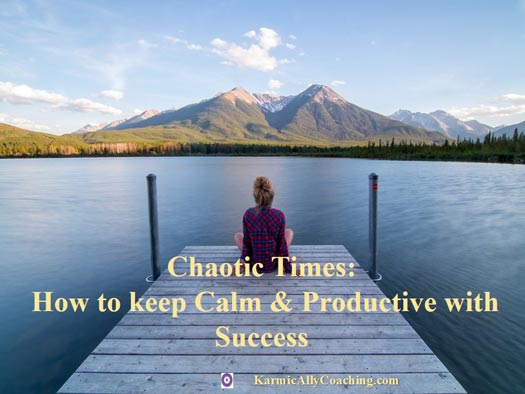
Among the many important lessons, I learned during my career in corporate finance was staying calm during chaos if one wanted to stay productive and meet deadlines without going into a flat line.
One of the worst memories I have is of the time when the insurance company I was working in introduced both a new accounting system and an insurance module system. It was supposed to make our life easier, but the insurance modules would crash without notice.
It’s another thing that we learned later that the vendor had over-promised. Our company which was to run the initial model which would then be transferred across the regional offices was their guinea pig!
Of course, they had to fix it which they did but the crashes always happened around monthly reporting. The quarterly reports were a nightmare.
If you want to know what chaos means, that was what my team and I were living.
It wasn’t just bookkeeping.
We had to make sure all premiums were accounted for; all claims were settled and avoid the embarrassing situation of not paying our vendors on time. Worse yet, the banking module doing a double payment.
When the crash happened, we would go back to a previous backup and then manually redo all the work we had done. Our head of Information Technology started making backups every 3 hours to help us – normally 2 backups a day should have sufficed.
As the Finance Director of that company, I had to work with the vendor and somehow keeping the morale of my department up. Even when I would have preferred hiding my head in the sand like an ostrich.
It was a battle between us and Chaos and who would win it.
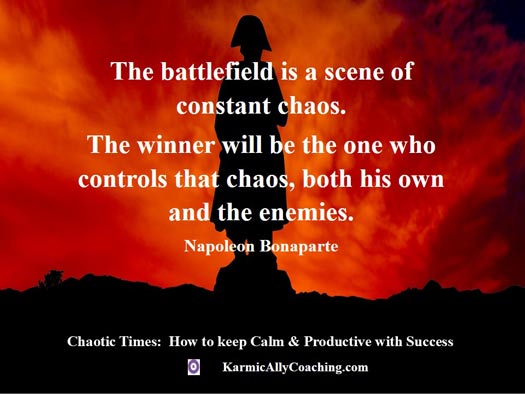
Memory is a strange thing.
It takes 1 little incident to remind us of what had happened earlier and to draw from our experience in order to cope with the new crisis.
In my case it was waking up one fine Monday morning to find the apartment had been flooded with water. The carpets were drenched, there was water in the living room and the bulk of it had collected in the kitchen.
The plumber came to see it and it turned out the leakage wasn’t in our pipes but those of our neighbor’s and their apartment was in a worse situation.
My poor neighbors were profusely apologetic and offered to get the carpet cleaned and all sorts of things. They didn’t need to do anything other than get the burst pipe fixed and call us if they had a repeat so I could be better prepared.
I’ve always believed that if I can get my Monday off to a good start then the rest of the week will go well.
My Monday wasn’t off to such a good start, but I could still get a handle of it if I wanted to.
So, after I finished getting the home back to a semblance of normalcy, I decided to take control of my day and get some calm back into it.
I stayed off social media, didn’t watch the news and reduced interactions with difficult people as much as possible.
Instead I focused on my energy and what I wanted to achieve during the week.
It’s my normal way of reclaiming my power over myself and balancing my energies using my favourite chakra balancing exercises.
My Blanchard Quadrants too came into play – if it wasn’t urgent or important or I didn’t have to do it or want to do it, the task was shifted to the next day or later for the week.
You see, no matter what is happening in your life and around you, the only thing you can control is yourself.
When others are stressed out, when chaos abounds all around you, you can manage your response and how you allow this out-of-control environment to affect you.
You can learn to be calm in the storm and remain productive despite chaotic conditions.
Not sure how?
Follow these 5 simple steps to learn to stay calm and be productive during the most challenging of times.
I learned it during my computer system crash days and can say with conviction that it works.
Step 1. Get your Stress under Control
You can’t remain productive and calm if you, too, are stressed out and feeling full of chaos. Learning to manage your personal stress and find ways to lower it when it is high are essential.
Deep breathing exercises are quite useful. Many people like to meditate to reduce stress. Going for a short walk can also help.
One of my favorite ways to do this is to gently tap my heart with my left hand fingers, breathe deeply and affirm ‘All is well’.
Find techniques that you can practice wherever you may be and use them often when things start to feel chaotic.
Getting your own stress under control means you are more likely to handle whatever comes your way productively.
Step 2. Focus on what you can control
In many situations, things feel crazy and chaotic because there is much that is outside of your personal control. To stay productive, you must focus only on that which is firmly within your influence.
Everything else is going to happen no matter what you do. But the things you can control are where you can make a difference.
So when we started having the system crashes, I discussed the matter with our Country Manager and the Head of IT and we decided to increase the number of backups and also set up a protocol system to discover where and when the crashes were taking place so we could reduce business disruption.
When you recognize that something is outside your power, let it go and move on.
Learning to focus on what you can change and ignoring the rest is a helpful strategy when things seem to be a little chaotic.
Step 3. Use your Resilience
The best trait you can cultivate for learning to stay calm amid turmoil is resilience. Resilience is your ability to adapt to stressful situations and bounce back from obstacles, setbacks, and unexpected outcomes.
Resilience is made from many traits and skills that you can practice and hone.
Here are just a few ways to develop your resilience.
- Learn to rely on your strengths.
- Connect with positive people around you to help you through challenging situations. Support is vital in all difficulties.
- Focus on solving the problem. The energy you spend on complaining, bemoaning your circumstances, and blaming others are not energy well spent. What can you do right now to solve the problem? Do that?
- Get perspective. Place the problem in the context of reality, focusing on its real significance in the grand scheme. This gives you the ability to focus on what is essential right now.
- Remain positive in your ability to make a difference and solve the problem. A positive mindset is crucial during challenging times.
For more tips, check out my presentation.
Step 4. Look for the Lessons in Every Situation
There is always something you can learn, even from the most chaotic of times. You can find many opportunities for growth if you have the right mindset.
I saw that in play when we used to have the crashes. My boss, the Country Manager would reframe the incident as a learning lesson. It was also a hands on lesson on Emotional Intelligence.
It’s a tool I value even today because difficulties give us an opportunity to exercise our focus and determination. During trying times we need to concentrate on maintaining a calm soul and conquer the challenges that face us.
Avoid being reactive to difficult situations that catch you off guard. You can choose to take the higher road.
Even if keeping calm is the least natural approach for you, develop the will to overcome the tough situation and learn from it.
What I realized back then and which serves me even now is that giving in to negativity only serves to worsen any situation – system crashes, floods from next door or anything awful that you can imagine to throw your work and life into a tizzy.
Instead, focus on overcoming the challenge at hand by counteracting negativity with positivity and peace.
Handle trying times by acting from a place of calm reasoning. When the soul is calm, we are able to think things through. By rejecting unease at our core, we make smart choices that produce finer results.
See the value in all your life experiences. Even obstacles become worthwhile and meaningful when seen in this light.
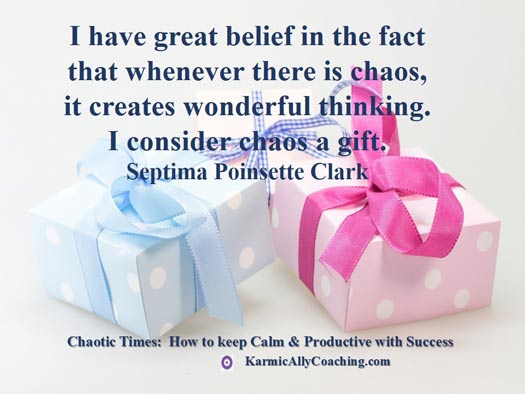
Step 5. Be Grateful for What is Good in Your Life
Remaining calm and productive when everything seems out of control can be hard. To keep an optimistic outlook and remain composed, think of those things that are really working in your life.
Studies have shown that the practice of gratitude is linked to our levels of happiness and contentment.
Gratitude is like magic! The more grateful you are the happier and the more content you become.
The book, “The Magic,” by Rhonda Byrne, author of “The Secret,” takes you through a step-by-step and 28-day formula for bringing more gratitude into your life.
Gratitude can truly transform your life, from one of misery and discontent to one of deep satisfaction and joy.
Ancient yogis knew about the secret power of gratitude: The yoga sutras speak of how being aware of and being grateful for the abundance of life and the flow of life that is all around us, opens the way for more streams of abundance to come to us.
When we focus on what we are grateful for, we get more of it. “That which you focus on grows,” according to mindfulness practitioners.
Therefore, when you focus on what you lack, you block the flow of unlimited potential, which exists in the universe.
When you focus on what you are grateful for, you open your heart to the infinite abundance, which is available to each one of us.
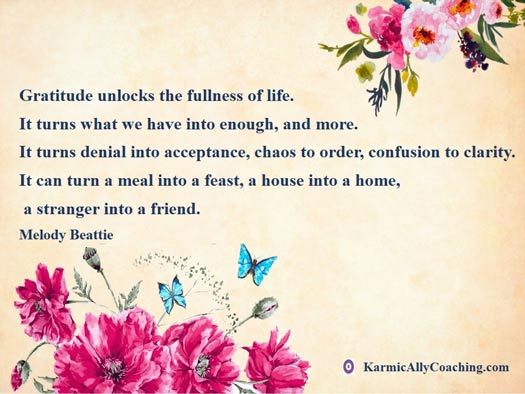
So, the days when the system didn’t crash at work, I was grateful for it and the gaps between the crashes started to increase.
As for the water made Monday disaster, the funny thing is, the minute I started to be grateful for all the things that didn’t get damaged and added to my gratitude list, the day went better and funnily enough, it was a productive Monday too!
Here are 2 simple daily practices I recommend building gratitude into your life:
- Keep a gratitude journal. At the end of each day, write down in your journal five things that happened in your day that you are grateful for.
- Carry a gratitude stone in your pocket. Find a rock or gemstone which appeals to you and put it in your pocket. Each time you touch the stone, remember the feeling of gratitude and something you are truly grateful for.
Make gratitude part of your daily practice for one month and notice the benefits. You will feel happier, more joyful, centered, and content. Being grateful truly works like a miracle and can transform the way you view the world.
The secret to an abundant life is all in how you view it. Even when something happens that hurts, there is a gift and a blessing to be found in the experience. If only you are open to seeing what it is!
Count your blessings and acknowledge your gratitude. This will help you place the chaos into perspective, as well.
Where will you focus your energy this week?
Additional Resource for staying calm and building your resilience to stress
If you’re looking for stress busting exercises that also build your resilience and sense of calm, then check out my Stress Management Bundle.
It has all my favorite Chakra balancing exercises, 1 Minute techniques to raise your vibration and attract what you want instead of what you want to get rid of, using your voice to reduce stress levels (I don’t mean shouting though) + some cool bonus resources.
How does a report on using crystals and gemstones for Chakra Meditation, a complete Chakra Chart and using the magic in your finger for immediate stress relief sound to you?
Good?
Then click here or the below image to learn more and download your bundle.
Update: 13 July 2024 – Overcoming Corporate Burnout
Too much of anything is bad for your mental, physical and emotional well-being.
That holds for stress and even chaotic workplaces.
The World Health Organization classifies burnout as a “syndrome” that is caused by “chronic workplace stress.”
Burnout is described as an “occupational phenomenon,” that can lead to serious physical and mental health concerns.
Corporate burnout is a growing issue that affects professionals across industries, leading to decreased productivity, compromised health, and diminished job satisfaction.
In “Overcoming Corporate Burnout,” you’ll discover practical strategies and actionable steps to reclaim your vitality and reignite your passion for your work. This concise, insightful guide is designed specifically for busy professionals who need quick yet effective solutions to manage stress and prevent burnout.
It’s been written by a professional who’s had to face burnout and survived.
Now it’s your turn to learn the basics to prevent burnout and start your road to recovery if you’re already experiencing burnout. Learn more here or by clicking on the book cover below.


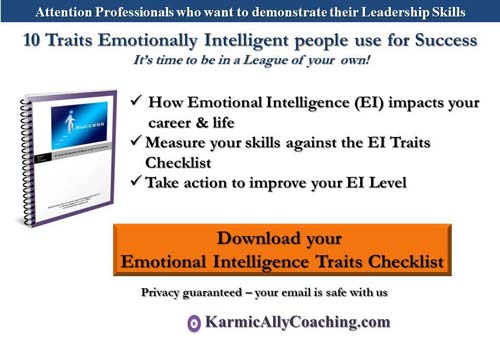

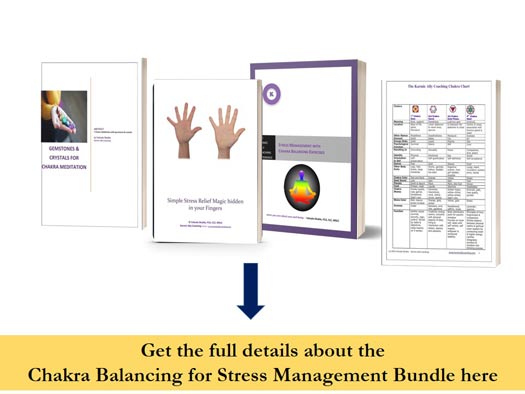
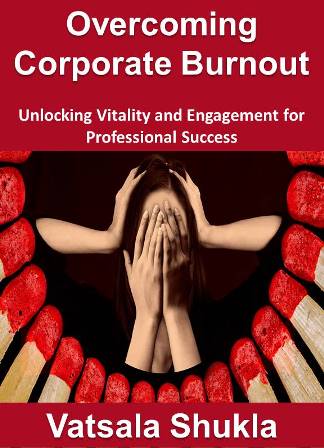

 I adhere to the Certified Coaches Alliance Code of Ethics and Standards. A copy is available on request.
I adhere to the Certified Coaches Alliance Code of Ethics and Standards. A copy is available on request.
 Let's Talk through the Connect Form:
Let's Talk through the Connect Form: